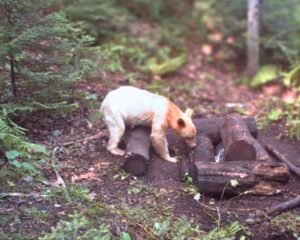In the wild, lions are often seen as the epitome of strength and fearlessness, ruling the food chain with their powerful hunting skills. However, an extraordinary event in the Madikwe Game Reserve, South Africa, has challenged the idea that predators are incapable of showing empathy. A lioness’s incredible behavior after discovering that her prey was pregnant has stunned wildlife enthusiasts around the world.
This story begins when a safari group witnessed a lioness capture a large antelope and begin her meal, only to pause when she discovered the unborn fetus inside her prey. What happened next was truly remarkable and left onlookers in awe.
The Start of a Rare Event
On a typical safari, a lioness’s hunt would end with her eating her catch. But on this occasion, things took an unexpected turn. The lioness, after realizing that her prey was pregnant, stopped eating immediately. The safari guide, Gerry Van Der Walt, leading the tour, explained that he had witnessed many hunts where the prey was pregnant, but this was different.
“Normally, they would just carry on feeding as if nothing was wrong,” Van Der Walt said. But the lioness’s reaction was nothing short of astonishing. She gently removed the fetus from the mother’s body and placed it on the ground, pacing around it as if assessing the situation. It was a moment that left everyone in the group speechless.
A Moment of Compassion
Instead of continuing her meal, the lioness began to inspect the fetus with great care. She nudged it with her nose, rolled it over gently, and even picked it up by the back of its neck as though it were one of her own cubs. The group of witnesses could hardly believe their eyes. “She very gently put the fetus on the floor, looking quite tense and nervous,” Van Der Walt recounted. “It was clear she was aware of what had happened.”
For several minutes, the lioness stayed close to the fetus, seemingly trying to determine whether it was still alive. When she realized that the unborn antelope was dead, she gently lifted the fetus and placed it behind a bush. This action, often interpreted as a form of respect, seemed to mirror human mourning rituals, adding an emotional layer to the lioness’s behavior.
The Lioness’s Mourning Ritual
What followed was even more astonishing. The lioness, after placing the fetus in a secluded spot, lay down next to her kill, appearing to reflect on her actions. Her body language indicated a deep sense of remorse and regret, a rare sight in the animal kingdom. Van Der Walt and his group were in awe of the lioness’s response to what had occurred. “She lay down next to the prey, as if in guilt,” he said. “And there she remained for quite some time.”
The lioness’s behavior raised profound questions. Was she feeling remorse for killing an innocent life? Was she mourning the loss of the unborn animal? These questions linger, as this rare moment showed that even the most fearsome predators are not devoid of emotional complexity.
What This Moment Teaches Us
This incredible event not only highlights the intelligence of lions but also their capacity for empathy. While hunting is a natural instinct for lions, this lioness displayed behavior that suggests animals can indeed experience compassion and even guilt. The fact that she paused, investigated the fetus, and then carefully placed it away from the remains of its mother shows that even in the wild, animals can demonstrate respect for life, something often attributed only to humans.
The lioness’s actions provide a powerful reminder of how complex the emotional lives of animals can be. While it’s easy to view animals as simple creatures driven by instinct, moments like these show that they are capable of experiencing emotions such as grief and empathy, much like humans.
Understanding Animal Emotions
What this lioness demonstrated is that emotional intelligence in animals, especially predators, is far more nuanced than previously believed. Her actions speak to the complex nature of animal behavior, one that we are only beginning to understand. This encounter challenges our traditional view of predators as mindless killers, instead painting a picture of animals as creatures capable of deeper emotional experiences.
It’s also a reminder that animals, like humans, are influenced by their environment, instincts, and experiences. The lioness’s display of empathy could have been driven by maternal instincts or an awareness of the life she had taken, but regardless of the reason, it was a touching and extraordinary display of compassion.
A Call for Further Reflection
This remarkable moment calls for greater reflection on the emotional capacity of animals and our relationship with them. It’s a story that not only highlights the importance of respecting the natural world but also encourages us to reconsider the way we view animals and their emotional lives. While we may never fully understand the lioness’s thoughts, her actions speak volumes about the complex emotional worlds that animals inhabit.
As we continue to learn more about animal behavior, stories like this remind us of the deep connections we share with the natural world. The lioness’s actions show that compassion is not limited to humans alone but is a universal trait that transcends species.
For more heartwarming and insightful stories, check out these articles:


